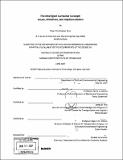| dc.contributor.advisor | Henry S. Marcus. | en_US |
| dc.contributor.author | Bryn, Peter Christopher | en_US |
| dc.contributor.other | Massachusetts Institute of Technology. Dept. of Civil and Environmental Engineering. | en_US |
| dc.date.accessioned | 2007-09-28T13:18:39Z | |
| dc.date.available | 2007-09-28T13:18:39Z | |
| dc.date.copyright | 2007 | en_US |
| dc.date.issued | 2007 | en_US |
| dc.identifier.uri | http://hdl.handle.net/1721.1/38956 | |
| dc.description | Thesis (S.M.)--Massachusetts Institute of Technology, Dept. of Civil and Environmental Engineering, 2007. | en_US |
| dc.description | Includes bibliographical references (p. 104-111). | en_US |
| dc.description.abstract | Shipping containers have been under increased scrutiny in recent years for two primary reasons. Within the private sector, they are one component of a continuing process by organizations to use effective supply chain management to their competitive advantage. Within the public sector, they are the central focus of a growing concern over cargo security. Indeed, these issues involve many parties, including regulators, carriers, shippers, container solution providers, research, and academia. Many of the proposed solutions involve new strategies, systems, and technologies applied to containers that fall into what this paper calls the "intelligent container concept." As a relatively nascent field, information is currently very fragmented, standards are still being researched, and few universal goals exist. This study is focused on compiling, understanding, and organizing the universe of options available, the concerns of the parties involved, the relevant and significant initiatives underway or completed, and the issues surrounding implementation. | en_US |
| dc.description.abstract | (cont.) While cost and technology are critical components of the debate, this study focuses more on the benefits that the proposed solutions might add and how they can be incorporated into the supply chain. This study is intended to familiarize the reader with the status and extent of the intelligent container field, though does not delve into the cost or technology issues since they vary greatly and are supply chain specific. | en_US |
| dc.description.statementofresponsibility | by Peter Christopher Bryn. | en_US |
| dc.format.extent | 111 p. | en_US |
| dc.language.iso | eng | en_US |
| dc.publisher | Massachusetts Institute of Technology | en_US |
| dc.rights | M.I.T. theses are protected by copyright. They may be viewed from this source for any purpose, but reproduction or distribution in any format is prohibited without written permission. See provided URL for inquiries about permission. | en_US |
| dc.rights.uri | http://dspace.mit.edu/handle/1721.1/7582 | |
| dc.subject | Civil and Environmental Engineering. | en_US |
| dc.title | The intelligent container concept : issues, initiatives, and implementation | en_US |
| dc.type | Thesis | en_US |
| dc.description.degree | S.M. | en_US |
| dc.contributor.department | Massachusetts Institute of Technology. Department of Civil and Environmental Engineering | |
| dc.identifier.oclc | 166275179 | en_US |
